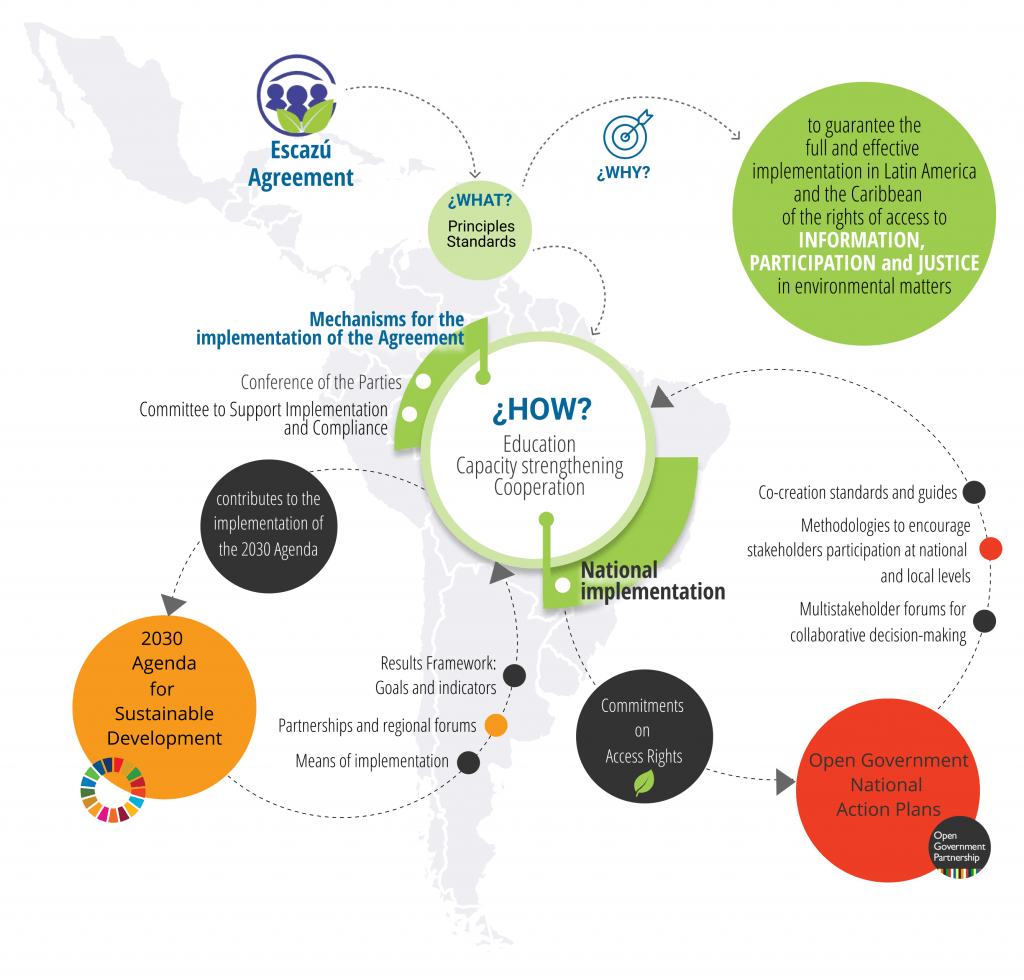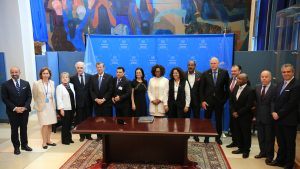Synergies Between the Escazú Agreement and Open Government to Strengthen Environmental Democracy in the Americas
Sinergias entre el Acuerdo de Escazú y gobierno abierto para fortalecer la democracia ambiental en las Américas
Countries in Latin America and the Caribbean are committed to the implementation of open government policies to strengthen transparencyAccording to OGP’s Articles of Governance, transparency occurs when “government-held information (including on activities and decisions) is open, comprehensive, timely, freely available to the pub... More in public administration, access to information, accountability, participation, and collaboration among governments, civil society and the private sectorGovernments are working to open private sector practices as well — including through beneficial ownership transparency, open contracting, and regulating environmental standards. Technical specificat... More.
The UN’s Economic Commission for Latin America and the Carribean (ECLAC) has supported and encouraged a paradigm shift in the public administration toward open States. Through its Institute for Economic and Social Planning (ILPES) and the Division for Sustainable Development and Human Settlements, ECLAC has actively facilitated open and collaborative instances and supported institutional capacity buildingEnhancing the skills, abilities, and processes of public servants, civil society, and citizens is essential to achieving long-lasting results in opening government. Technical specifications: Set of ac... to open up and increase the transparency of public institutions.
Strengthening institutions is key to improving governance in public affairs, which in turn is crucial to enhance justiceTo address barriers that prevent citizens from having their justice needs met, OGP participating governments are working to expand transparency, accountability, and inclusion into all systems of justi..., equality and sustainability in the three dimensions of development: social, economic and environmental.

On March 4, 2018, the Regional Agreement on Access to Information, Public Participation, and Access to Justice in Environmental Matters in Latin America and the Caribbean (Escazú Agreement) was endorsed in Escazú, Costa Rica. The agreement is to be signed and ratified by the 33 countries in the region. The Agreement requires at least 11 ratifications to come into effect.
The Escazú Agreement represents an opportunity to guarantee the application of open government principles – transparency, participation, and collaboration – in the design, monitoring, and evaluation of policies, programs, and projects that have environmental impact. The aim is to guarantee safe and equitable conditions to exercise the rights of access to information, participation, and justice in environmental matters.
It also focuses on ensuring equality and non-discrimination in the exercise of rights, with emphasis on vulnerable groups, leaving no one behind. OGP’s gender and inclusion campaign Break the Roles evokes this same notion and calls for the inclusionOGP participating governments are working to create governments that truly serve all people. Commitments in this area may address persons with disabilities, women and girls, lesbian, gay, bisexual, tr... More of all citizens and to guarantee equal conditions in open government processes so that reforms and agreements such as Escazú reflect their interests and needs.
The countries that endorse the Escazú Agreement will define mechanisms, policies, and strategies to guarantee the application of its provisions. Synergies will be created between decisions made with significant public participationGiving citizens opportunities to provide input into government decision-making leads to more effective governance, improved public service delivery, and more equitable outcomes. Technical specificatio... at the first Conference of the Parties – the main implementation mechanism of the Agreement – and the open government action planAction plans are at the core of a government’s participation in OGP. They are the product of a co-creation process in which government and civil society jointly develop commitments to open governmen... co-creation processCollaboration between government, civil society and other stakeholders (e.g., citizens, academics, private sector) is at the heart of the OGP process. Participating governments must ensure that a dive... of the Open Government PartnershipThe Open Government Partnership (OGP) is a multi-stakeholder initiative focused on improving government transparency, ensuring opportunities for citizen participation in public matters, and strengthen... More.
Commitments under OGP and the Escazú Agreement complement and reinforce each other. The transparency, participation, and collaboration tools, mechanisms, instruments, and platforms related to the open government action plan co-creation process contribute to the implementation of the Escazú Agreement. In turn, the Escazú agreement provides regional standards on information, participation and justice in environmental matters that can greatly benefit OGP.
The Escazú Agreement contributes to transparent, participative and just environmental administration, fostering good governance and sustainable development, and advancing the implementation of the Agenda 2030 and the Sustainable Development GoalsOGP countries are experimenting with open government innovations to accelerate progress on the Sustainable Development Goals, particularly SDG 16+ which includes peaceful, just and inclusive societies.... Like the open government action plans, the Agreement contributes to deeper democracies and social cohesion in the region, building trust in public decision-making, and eliminating inequalities.
Los países de América Latina y el Caribe están comprometidos con la implementación de políticas de gobierno abierto para fortalecer la transparencia en la gestión pública, el acceso a la información, la rendición de cuentas, la participación y la colaboración entre gobierno, sociedad civil y sector privado.
La Comisión Económica para América Latina y el Caribe (CEPAL) de las Naciones Unidas ha acompañado e impulsado el cambio de paradigma de gestión pública hacia el Estado abierto. A través del Instituto Latinoamericano de Planificación Económica y Social (ILPES) y de la División de Desarrollo Sostenible y Asentamientos Humanos, ha tenido un rol activo como facilitador de instancias abiertas y colaborativas, y ha apoyado el fortalecimiento de capacidades institucionales para abrir y transparentar las instituciones públicas.
Fortalecer la institucionalidad es un aspecto clave para mejorar la gobernanza en los asuntos públicos, que es indispensable para alcanzar la justicia, la igualdad y la sostenibilidad del desarrollo en sus tres dimensiones: social, económica y ambiental.

El 4 de marzo de 2018 fue adoptado, de forma abierta y participativa, el Acuerdo Regional sobre el Acceso a la Información, la Participación Pública y el Acceso a la Justicia en Asuntos Ambientales en América Latina y el Caribe (“Acuerdo de Escazú”) en la ciudad de Escazú, Costa Rica. Se encuentra abierto a la firma y ratificación de los 33 países de la región, requiriendo un mínimo de 11 ratificaciones para entrar en vigor.
El Acuerdo de Escazú representa una oportunidad para garantizar la práctica de los principios del gobierno abierto –transparencia, participación y colaboración- en el diagnóstico, la formulación, el seguimiento y evaluación de las políticas, programas y proyectos con impacto ambiental; garantizando a la ciudadanía condiciones seguras y equitativas para ejercer los derechos de acceso a la información, la participación y la justicia en asuntos ambientales.
Se enfoca además en asegurar la igualdad y la no discriminación en el ejercicio de los derechos, prestando especial atención a las personas y grupos vulnerables y buscando no dejar a nadie atrás. La campaña de género e inclusión de la Alianza para el Gobierno Abierto (OGP por sus siglas en inglés) Break the Roles evoca esta misma noción y hace un llamado a incluir a la ciudadanía y garantizar igualdad de condiciones en los procesos de gobierno abierto, para que las reformas y acuerdos como el de Escazú reflejen sus intereses y necesidades.
Los Estados partes del Acuerdo de Escazú deberán definir mecanismos, políticas y estrategias que garanticen la aplicación de las disposiciones del Acuerdo. Es aquí donde se hace evidente la sinergia entre las decisiones que se tomarán, con una significativa participación del público, en la Primera Conferencia de las Partes –principal mecanismo de implementación del Acuerdo- y el proceso de co-creación de planes de acción de gobierno abierto en el marco de la Alianza para el Gobierno Abierto.
Los compromisos asumidos en el marco de OGP y del Acuerdo de Escazú se complementan y refuerzan mutuamente. Las herramientas, mecanismos, instrumentos y plataformas de transparencia, participación y colaboración que constituyen el proceso de co-creación de planes de acción de gobierno abierto, contribuyen a la implementación del Acuerdo de Escazú. Del mismo modo, el Acuerdo de Escazú ofrece estándares regionales en materia de información, participación y justicia en asuntos ambientales de gran utilidad para la Alianza para el Gobierno Abierto.
El Acuerdo de Escazú fortalece una gestión ambiental transparente, participativa y justa, favoreciendo la buena gobernanza y la sostenibilidad del desarrollo, contribuyendo de esta forma a la implementación de la Agenda 2030 y los Objetivos de Desarrollo Sostenible. Al igual que los planes de acción de gobierno abierto, también aporta a la profundización las democracias y la cohesión social en la región, generando confianza en las decisiones públicas y eliminando asimetrías.
No comments yet
Related Content
Gobierno Abierto e inclusión: camino a la igualdad y la no discriminación
OGP Fact Sheets
Explore global progress and member-level examples of open government work in each of the selected policy areas and various regions.


Leave a Reply